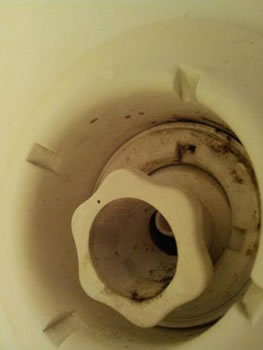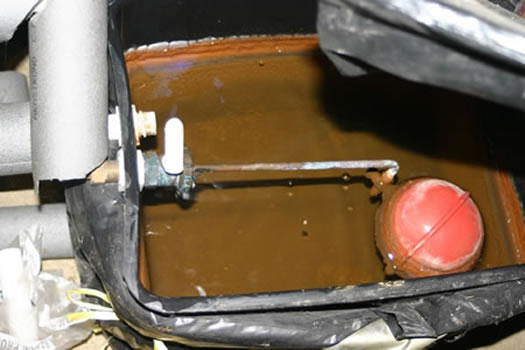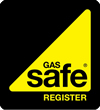Legionnaires' Disease & Landlords
Letting agents and landlords are obliged by law to carry out risk assessments for Legionnaires' Disease, and if necessary, take action.
 What is Legionnaires' Disease?
What is Legionnaires' Disease?
Legionnaires' Disease is a Pneumonia-like illness caused by the Legionella bacteria, which can be fatal.
Legionella bacteria are widespread in rivers, lakes and water systems where the temperature of the water is such as to encourage growth of the bacteria, e.g. a hot water system. People can catch the disease by inhaling small droplets of water which may be suspended in the air and contain the bacteria. Stored and recirculated water is a particular risk.
What can Trevolution do?
At Trevolution we have engineers trained in the prevention and water treatment procedure for Legionnaires'. Most small systems only need a risk assessment and no further action required by the landlord or the agent. Having the evidence available that the risk assessment has in fact been carried out is important for the agent or landlord.
Who is responsible?
Where a property is under full management by a professional agent, then clearly the agent has responsibility for meeting these legal requirements. However, where the landlords is managing the property him or herself, then the landlords takes on that responsibility along with all the other legal requirements such as annual gas checks etc.
However, landlord or individual buy-to-let properties are also affected by this. Although an individual house our flat generally poses no greater risk for legionella than an owner occupied property, unless there are unusual circumstances, nevertheless there is still a risk which must now be addressed by all landlords and agents.
The guidance specifies annual risk assessments and insists that landlords and agents keep records of these for at least five years.
Landlords and agents should be aware that legionella bacteria can multiply in hot or cold water systems and water storage tanks. The bacteria can be spread via showers and taps, especially if they have not been used for some time. The risk assessments must assess the risk and identify potential sources of exposure, followed by, if necessary, and steps to prevent or control any of the identified risks.
A risk assessment involves assessing whether conditions are right for bacteria to flourish. The greatest risk is where water is present at temperatures between 20C and 45C. Stagnant water, in tanks for example, infrequently used outlets like showers, debris in water systems, and thermostatic mixing valves should checked and corrective action taken where necessary.
Safeguards may involve disinfecting water systems, cleaning shower heads, insulating pipework, and keeping water cisterns properly covered and free of debris.
Landlords and agents should issue tenants with notices advising them about these risks and how to combat them by running water off and cleaning shower heads regularly.
When landlords and agents advise tenants to raise water temperatures to reduce the risk of legionella, there’s an increased risk of burns and scalding.
HSE Approved Code of Practice and Guidance
The Health & Safety Executive (HSE) have an Approved Code of Practice and Guidance as regards Legionnaires' Disease. The Code can be found here:- http://www.hse.gov.uk/pubns/priced/l8.pdf
The Code confirms that private landlords have a duty to carry out risk assessments on water systems in their properties. Formerly, the Code imposed a 300 litre limit for hot and cold water services, which effectively removed any responsibility from private landlords as regards risk assessments of normal domestic water systems. However, with the removal of the 300 litre limit, private landlords now have an obligation to comply with the Code.
The Code requires private landlords to carry out:
- A risk assessment to identify and assess potential sources of exposure, and thereafter, where a risk has been identified to introduce a course of action to prevent or control any identified risk.
- The risk assessment can be carried out by the landlord himself if he is competent to do so, or alternatively can be done by a suitably qualified third party. The ultimate responsibility remains with the landlord, even where he employs a letting agent to manage the property on his behalf.
 Legionnaires Disease is potentially a fatal lung infection caused when individuals inhale legionella bacteria. The bacteria can exist in any man made water systems eg water storage systems, taps, pipework etc. Issues to be considered when carrying out a risk assessment include:
Legionnaires Disease is potentially a fatal lung infection caused when individuals inhale legionella bacteria. The bacteria can exist in any man made water systems eg water storage systems, taps, pipework etc. Issues to be considered when carrying out a risk assessment include:
- Where water is stored between 20 & 45 degrees
- Where there is stagnant water in any area of the water system
- Where there is rust, sludge, scale or organic matter in the water system
- Whether there are any outlets which are not frequently used, for example showers or taps in second bathrooms
- Where tenants are particularly at risk due to age, illness or weakened immunity.
- Landlords must regularly review the risk assessment and keep records of same.
- Where risks are identified, the landlord must take appropriate action.
It all sound very onerous on landlords or agents but these risk assessment are usually straightforward and not as bad as they seem.





